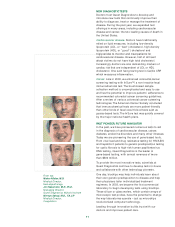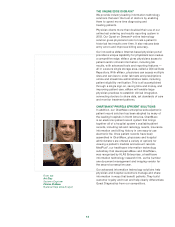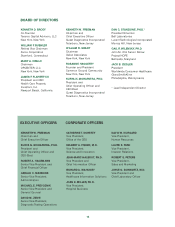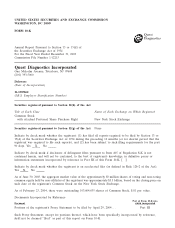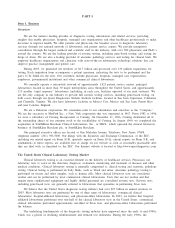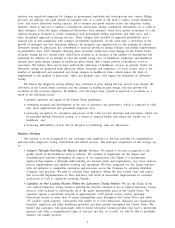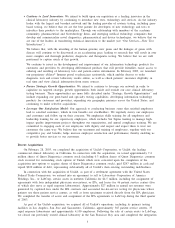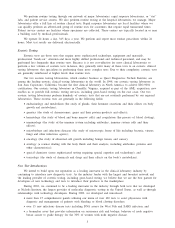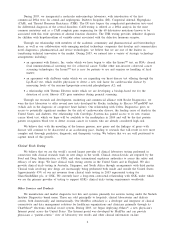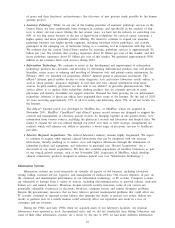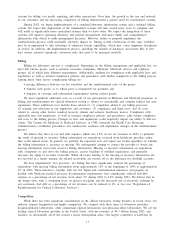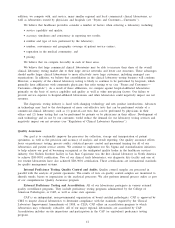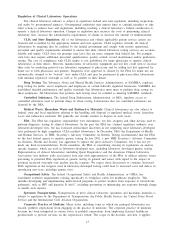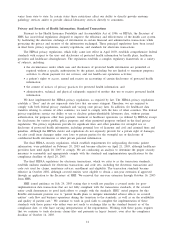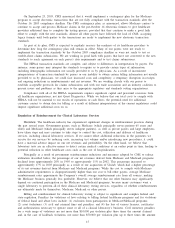Quest Diagnostics 2003 Annual Report Download - page 23
Download and view the complete annual report
Please find page 23 of the 2003 Quest Diagnostics annual report below. You can navigate through the pages in the report by either clicking on the pages listed below, or by using the keyword search tool below to find specific information within the annual report.During 2003, we inaugurated a molecular endocrinology laboratory, with introduction of the first
commercial DNA tests for central and nephrogenic Diabetes Insipidus (DI), Congenital Adrenal Hyperplasia
(CAH), and Thyroid Hormone Resistance (THR). The DI tests bypass the complicated perturbation tests used
for differential diagnosis of the several disorders. CAH testing is offered as a DNA analysis for the most
common mutations and as a CAH complete gene sequencing for the 60 deleterious mutations known to be
associated with this wide spectrum of adrenal function disorders. The THR testing provides definitive diagnosis
for children with hypothyroidism of variable extent associated with the defective hormone receptor.
Through our relationship with members of the academic community and pharmaceutical and biotechnology
firms, as well as our collaboration with emerging medical technology companies that develop and commercialize
novel diagnostics, pharmaceutical and device technologies, we believe that we are one of the leaders in
transferring technical innovation to the market. During 2003, we entered into a variety of strategic technology
arrangements including:
•an agreement with Enterix, Inc. under which we have begun to offer the InsureTM test, an FDA- cleared
fecal immunochemical screening test for colorectal cancer. Unlike other non-invasive colorectal cancer
screening technologies, the InsureTM test is easy for patients to use and requires no handling of fecal
matter;
•an agreement with diaDexus under which we are expanding our heart disease test offering through the
Lp-PLA2 test, which enables physicians to detect a new risk factor for cardiovascular disease by
measuring levels of the enzyme lipoprotein-associated phospholipase A2; and
•a relationship with Thermo Electron under which we are developing a biochip-based test for the
detection of cystic fibrosis (CF) gene mutations during prenatal screening.
Through our research and development, marketing and commercial alliance with Roche Diagnostics, we
were the first laboratory to offer several new tests developed by Roche, including its Elecsys NT-proBNP test
(which aids in the diagnosis of congestive heart failure). Our relationship with Celera Diagnostics gives us
access to potentially significant markers for the risk of cardiovascular disease, the leading cause of death in the
United States, and diabetes. Our relationship with Correlogic Systems has gained access to its new ovarian
cancer blood test, which we hope will be available to the marketplace in 2004 and will be the first protein
pattern recognition blood test to detect ovarian cancer in women who are already considered high risk.
We believe that, with the unveiling of the human genome, new genes and the linkages of genes with
disease will continue to be discovered at an accelerating pace, leading to research that will result in ever more
complex and thorough predictive, diagnostic and therapeutic testing. We believe that we are well positioned to
capture much of this growth.
Clinical Trials Testing
We believe that we are the world’s second largest provider of clinical laboratory testing performed in
connection with clinical research trials on new drugs in the world. Clinical research trials are required by the
Food and Drug Administration, or FDA, and other international regulatory authorities to assess the safety and
efficacy of new drugs. We have clinical trials testing centers in the United States and in England. We also
provide clinical trials testing in Australia, Singapore, and South Africa through arrangements with third parties.
Clinical trials involving new drugs are increasingly being performed both inside and outside the United States.
Approximately 45% of our net revenues from clinical trials testing in 2003 represented testing for
GlaxoSmithKline plc, or GSK. We currently have a long-term contractual relationship with GSK, under which
we are the primary provider of testing to support GSK’s clinical trials testing requirements worldwide.
Other Services and Products
We manufacture and market diagnostic test kits and systems primarily for esoteric testing under the Nichols
Institute Diagnostics brand name. These are sold principally to hospitals, clinical laboratories and dialysis
centers, both domestically and internationally. Our MedPlus subsidiary is a developer and integrator of clinical
connectivity and data management solutions for healthcare organizations and clinicians primarily through its
ChartMaxxt electronic medical record system. During 2003, we began deploying eMaxxt, a new physician’s
Internet portal across the United States. The Internet portal was developed by MedPlus and can provide
physicians a “patient-centric’’ view of laboratory test results and other clinical information on-line.
6


